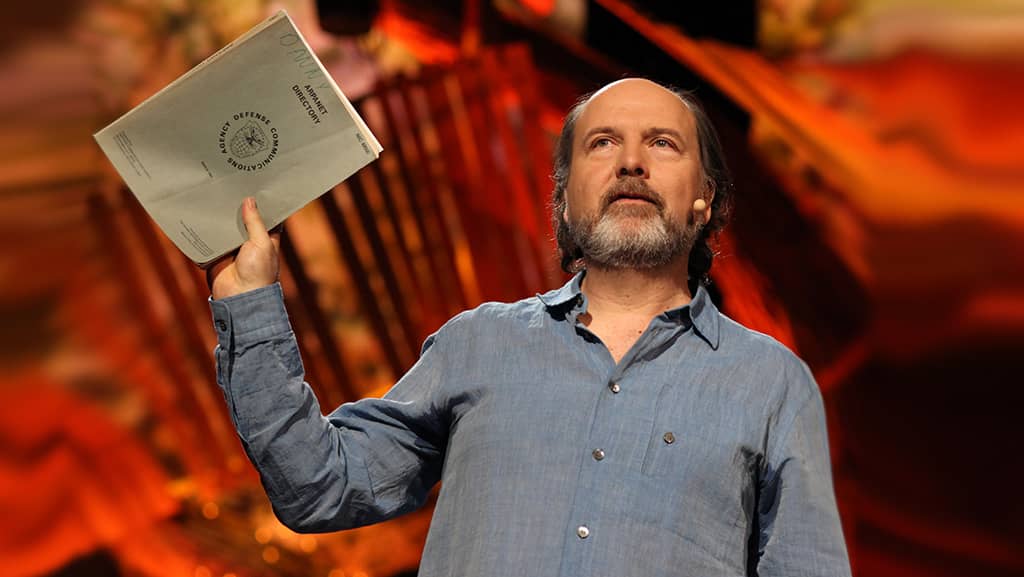
Guerillas Launch Cyber Attack, Gorillas Play the Piano: The 4 Best Tech TED Talks
The annual TED conferences bring together the world's most fascinating thinkers who are challenged to give the talk of their lives in 18 minutes or less.
Here we introduce you to four of the best sermons on technology.
1. Cars talking behind our back? It's a good idea
Driving is a very dangerous activity (the leading cause of death in those aged between 16 and 19) yet most of us insulate ourselves in a bubble once we get inside our cars. For many of us the whole point of using a car is to create our own personal space whereby we DON'T have to communicate with our fellow man! Why, sometimes, we even darken our windows to avoid being seen!
Trouble is, non-communication presumes that driving is a seamless process. This is manifestly not the case. What if a driver suddenly has to brake to a complete stop? The inexperienced teenage driver behind may get into trouble.
What if cars could warn each other about the erratic behavior of a wayward, reckless motorcyclist or driver? Jennifer Healy, launching a presentation called "If cars could talk, accidents might be avoidable," says it would be better if cars COULD communicate with each other, to talk behind your back. Not to monitor conversations in a prurient way but rather track your movements and alert other vehicles in the area -- a kind of interactive GPS system with cars exchanging data.
What if a system could make a reasonable prediction about a "dangerous car based on its current position, trajectory and velocity? What if it could predict the vehicle's imminent course and allow other drivers to get out of the way? But are we willing to share such data? Definitely a lot of food for thought here.
2. Alien life or free coffee?
For many years people asked themselves: is there life out there? But since our galaxy is one of a hundred million, for us to be truly alone would be extraordinary. Perhaps, according to the experts, the more pertinent question is: WHEN will we discover life?
Seth Shostak, launching his presentation called "What if ET is out there?" believes that advancing technology will enable to us to discover life in two dozen years. Or he offers to buy us a cup of coffee. He says that such an alien civilization is bound to be more advanced than ours. (A question from a layman. Why is that? If they were really so advanced, would not they have discovered US already?)
Anyway, Shostak makes the case that there is plenty of real estate in the universe. We could even have as many as a billion cousins out there, he believes. He reckons the discovery of life will "calibrate" us making us more humble with our realization that we are not unique. We may even be able to "short-circuit history" by getting information that's way ahead of us. Also, if we do find a civilization much more advanced than ours, it will show us that enhanced technology does not necessarily doom us to self-destruction as some would have it.
Ummm, I'm not totally convinced that we will find alien life in that time span. In 2036 I may be able to get a free cup of coffee.
3. Plan B for the internet
Despite the extraordinary and exponential strides we have made in technological innovation, when we ponder the nature of destruction we still imagine rockets and bombs. The danger posed by cyber terrorism, on the other hand, has never been taken seriously. Yet one of the biggest threats to mankind is that of the lone wolf, the one-man guerilla (with a grudge against social media perhaps?) who could find a way to disable worldwide communications. Or perhaps a rogue state hacking into top secret defense data and deliberately supplying wrong information?
Danny Hillis, in his presentation "The internet could crash," explains that we urgently need a strategy to stop a worldwide meltdown. Fact is, we still don't have a Plan B, although countless administrative and service functions now depend on the internet.
4. Dr Dolittles, all of us
Dolphins have long been a source of fascination for mankind. Even back in the 1970s a whole film, The Day of the Dolphin (see below), was centered on them. Dolphins are very self-aware, friendly and social and apparently have advanced cognitive skills. Ok, it may be a long time before a dolphin composes an aria or pens some poetry but they and other animals are brighter than we think.
This talk shows videos of dolphins playing with keyboards through which they are able to request certain rewards. It also shows an orangutan striking a melodic tune on a piano. How can we unleash their skills and, even more importantly, communicate with them? Could the internet be expanded to include sentient species like them? What is clear is that, according to the experts, many animals are capable of self-organized learning on the internet.
Animals seems to get a handle on our language faster than we realize. Perhaps it's not so strange when we consider that orangutans share around 97 per cent of our DNA. If we can find a way to transcend language -- rather like a group of musicians from different countries would through their shared love of music -- then we may find a way to establish a kind of inter-species internet. The internet is not just for humans.
Innovative ideas in this TED address entitled "The interspecies Internet, an idea in progress," come from the likes of dolphin researcher Diana Reiss, musician Peter Gabriel, Neil Gershenfeld and Vint Cerf.
By the way, an ideal present would be bulk thumb drives with the best TED talks on them. These presentations are a window into the future and make for fascinating viewing.








